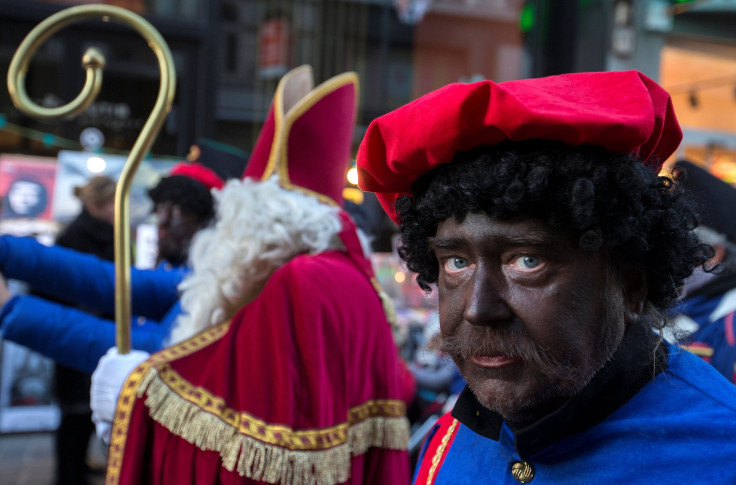Black Pete Racist? Dutch Christmas Tradition Of ‘Zwarte Piet’ In Blackface Continues To Stir Controversy

While hordes of drunken revelers dressing up as Santa Claus may once a year provoke ire on the streets of New York City, SantaCon is no match for the controversy continuing to be stirred up by a traditional Dutch Christmas character.
Zwarte Piet, or Black Pete, stems from the Dutch legend of Sinterklaas, which saw St. Nicholas delivering presents in Spain with a team of black helpers. Since 1850, Black Pete has been a prominent character in those stories, disciplining misbehaving children by in some cases kidnapping them and bringing them back to Spain.
Given that, at the time the character emerged, slavery was common in the Dutch colonies and the character has exaggerated lips, an afro wig and earrings, it has long been met with charges of racism. That people often celebrate the character by dressing up in blackface only adds weight to that assessment. And while some claim that Black Pete looks the way he does due to soot from going down the chimney, it is commonly accepted that he, in fact, represents a Spanish Moor slave.
This year, the controversy even spread to Canada. The Dutch Delicious bakery in Edmonton had featured a representation of Black Pete every year for a decade to celebrate Sinterklaas, but last week it issued an apology after receiving a number of complaints, according to Canadian outlet Global News. The bakery has said that in the future it will instead feature Chimney Piet, a character with soot streaks on his face, without the curly hair and red lips.
The same accommodation has been put forward by Amsterdam’s Sinterklaas Party for the first time this year. A local court in 2014 had told the city’s mayor to remove Black Pete from the parade but the decision was later overturned by the Netherlands’ highest court when it refused to rule on whether the character breached anti-discrimination laws.
The country’s prime minister has been similarly evasive on the issue. Responding to criticism in 2014, Mark Rutte said: “Black Pete, that already says it, he’s black. We can’t change much about that.” After confrontations in Rotterdam last month between supporters and opponents of Black Pete led to 100 arrests, Rutte appealed for calm on both sides.
Weighing in on the matter last year, the Human Rights Commission of the United Nations was in no doubt about the correct course of action for the Dutch government. Recommending that the character at least be altered, a report wrote that in its current guise Black Pete is “injurious to the dignity and self-esteem of children and adults of African descent.”
“The Committee recommends that the State party actively promote the elimination of those features of the character of Black Pete which reflect negative stereotypes and are experienced by many people of African descent as a vestige of slavery,” read the report.
© Copyright IBTimes 2024. All rights reserved.





















